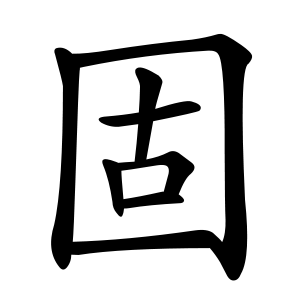固
- firm, solid, stubborn;
Etymology
Phono-semantic compound:
囗 — “to enclose” or “surround,” giving the sense of being fortified or contained;
古 — provides sound and also implies something time-worn or enduring.
Originally, 固 suggested “an enclosed old settlement” or a fortified, secure place. Over time, it extended metaphorically to solid or strong (physically or emotionally), and stubborn, rigid in one’s thinking.
Usage in Korean
Often appears in compounds like:
堅固 (견고) – solid, firm;
固執 (고집) – obstinate, stubborn;
固有 (고유) – inherent, native.
Words that derived from 固
- 고사(固辭)–refusal
- 고유(固有)–uniqueness
- 고유 명사(固有名詞)–proper noun
- 고집(固執)–persistence; stubbornness; obstinacy
- 고집불통(固執不通)–being headstrong; being willful
- 고집스럽다(固執스럽다)–headstrong; willful
- 고집스레(固執스레)–in a headstrong manner; willfully
- 고집쟁이(固執쟁이)–headstrong person
- 고집하다(固執하다)–persist in; hold fast to
- 고형(固形)–solid
- 황소고집(황소固執)–stubbornness; persistence
